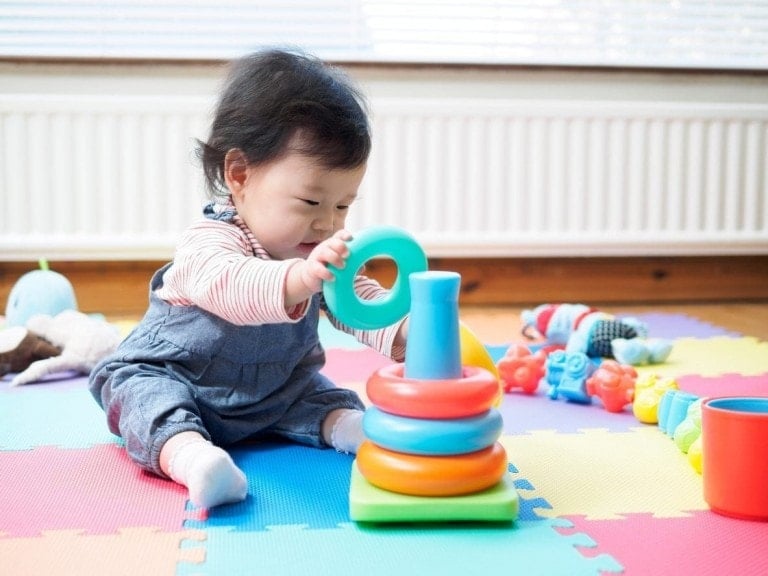When first asked to write about life with special needs children, I didn’t know where to begin. All I could think was: It’s all-consuming. Let’s face it: parenting is HARD. Parenting children with special needs can add an extra layer of stress to a family dynamic. You also need meticulous organization skills and work out a family budget for all the doctor appointments your unique child will have.
Take deep breaths and hang in there. You can do this, even if you shed some tears and anxiety screams along the way.
Raising kids with special needs takes a village and a city, and we need to support each other on the journey of parenting. I hope you find some of this information helpful. Please remember on those extra-stressful days and nights that you are not alone.
40 Things Parents of Special Needs Children Want You to Know
1. Do Not Blame Yourself for Your Child’s Diagnosis
It’s easy to blame yourself or your partner for your child’s disability, but that will get you nowhere. Instead, it’s better to focus on the now and the future. Besides, while genetics can play a significant role in your child’s development, you can’t change your genes or the genes of your child’s other biological parent. Channel that energy into helping and supporting your child instead of pointing fingers.
2. Familiarize Yourself with Early Intervention
Depending on where you live, your child may qualify for speech therapy, occupational therapy, physical therapy, and other services through the city or state. Look for these through your state’s education department or health department. Therapists work with your child one-on-one at home, at their school, or in a sensory gym. Contact an early intervention provider if your child has delays and qualifies for services. Early intervention is for children three and younger, though. Call your school district if your child is over three and may need services for the first time.1
3. Know What a Sensory Gym Does
Sensory gyms are organized and arranged as therapy centers for kids with diagnosed special needs. Often, a licensed, certified therapist will work with your child there instead of at home or school. Most sensory gyms look like typical play spaces, but with softer lighting, no loud noises or music, bubble machines that can be calming, simple toys and climbing structures, swings, and weighted hammocks used by occupational therapists (OTs). If your child qualifies for developmental services through their school district, they may be able to meet with their therapist at a sensory gym.2
4. Always Listen to Your Gut
When she was 14 months old, I had a strong feeling my daughter had significant speech, physical, and emotional delays. When I expressed it aloud, some family members joked I was “neurotic.” It turns out my parenting intuition was correct. I knew in my heart my daughter needed early intervention services. Listen to your parenting gut because it will rarely steer you wrong. As they say, Mom knows best.
5. ‘Date’ Pediatricians Until You Find ‘the One’
Finding a great doctor can be like dating; you “try” a few until you click with one. Our original pediatrician knew very little about developmental delays and seemed annoyed when we asked questions about the signs of autism. We switched to a pediatrician who understands sensory kids and is supportive and kind. Don’t feel bad about “doctor shopping” until you find a medical team you love. You may have to drive an extra 20 minutes to see a fantastic doctor, but it’s worth it if they’re gentle and knowledgeable with and for your child.
6. Understand That Developmental Pediatricians Have Wait Lists
Many parents opt for a formal diagnosis from a developmental pediatrician. However, these autism and disability experts can be hard to find and have long waiting lists. Put yourself on every waiting list and drive to another state if necessary. They are in-demand doctors, so acknowledge you may have to wait 6-10 months for an appointment. These specialists are also usually separate from your child’s traditional pediatrician.
7. Give Yourself a Good Cry
Parenting a special needs child is so complex, and you will feel frustrated, overwhelmed, angry, sad, and even lonely. You run the gamut of emotions, sometimes even on your kitchen floor. You’re human! Cry it all out. Your feelings are raw, and they are REAL.
8. Praise, Praise, and Praise Your Child
As hard as it can be if you are having a bad day, reward your child for things that may seem minute. They are milestones, not too big or too small. For example, when my speech-delayed daughter finally and clearly shouted, “Bye, Mommy!” (And waved!) I cheered and pranced around like a cheerleader in the therapist’s office because I was so proud of her. Shout it from the rooftops. Your excitement makes them feel wonderful and may motivate them to say and do more.
9. Carve Out Time for Yourself
This is hard, regardless of whether your child has special needs. But you’ll be a calmer, more patient, and possibly even more understanding parent if you take some time for a mani-pedi, a solo trip to Target, or even just brunch with a friend. When someone depends on you 24/7, you need to step away sometimes and breathe. Alone.
10. Consider Meeting with a Therapist
I have been in talk therapy to help process my emotions as a special needs parent. The therapist I have weekly Zoom sessions with specializes in families with disabilities. Ask your primary care doctor for a referral, and yes, many therapists take insurance. It’s nice to have an outlet to vent to a professional who helps me process everything my family is going through.
11. Watch All the Special Needs Movies
So many inspirational movies exist about special needs kids and adults. When I am feeling bummed, I will watch one because they help trigger my inner Mama Bear. They remind me that I will always be a voice and advocate for my child and other special needs individuals. Some of my favorite films are Mask, My Left Foot, Wonder, The Peanut Butter Falcon, Rain Man, I Am Sam, Finding Dory, CODA, What’s Eating Gilbert Grape, and The Theory of Everything.
12. Join Special Needs Facebook Groups
I cannot stress enough how important this is. Most of these are safe spaces online where fellow special needs parents can gather and exchange information about therapists, schools, and services and vent with like-minded parents. I have learned much from the parents who post in these groups. It’s easy to feel lonely as a special needs parent. Run a Facebook search for a special needs parenting group in your town where you can post questions anonymously.
13. Be Open
This is hard, but try to be open to others about how you feel. You will be shocked by who supports you. I once randomly opened up to a bank teller about my child’s niche needs, and she said she also has a special needs child. We exchanged information on therapists we liked and recommended and bonded in a way you just can’t with all parents. She went from stranger to ally. I also once confided in another mom that I had trouble finding a great behavior therapist for my daughter. She immediately called her child’s therapist and asked if she could see my daughter. That’s how we found one of the best therapists ever. Could you imagine if I kept my mouth shut?
14. Don’t Be Mad at Friends Who Don’t Understand
Unless they make a totally rude comment. You may have friends who don’t understand what it’s like to parent a special needs child. Try to understand that they don’t understand but are trying to. I didn’t know much about special needs before I had my children. Lashing out at friends and family who are genuinely trying to support you is easy. But keep in the back of your mind that they just don’t get it, and that is okay. Especially if they’re trying!
15. Hear Others Out
You may know your child best, but don’t automatically say no if a special needs educator brings up some games, activities, or even a class that may be good for your child. They may have a different educational or social approach for your child that could be great for them. They work in the field and with other kids, so hear them out. COO and co-founder of Playgarden, Amanda Vierheller, suggests looking for teachers “who will set up a plan of regular communication with parents to ensure consistency for children at school and home to help provide feelings of security and stability.”
16. You Will Be Embarrassed by Your Child
You will indeed feel humiliated by your special needs child in public and feel guilty about this. I was embarrassed when my daughter recently rolled herself across the floor of the shoe department at Macy’s because she was stimming. When a child stims, it’s a need to perform a specific physical action, such as flapping your hands or lying on the floor, to self-regulate.3
Remember: Your child can’t help how they are; if others have an issue with their actions, it is too bad for them. They’ll have to understand your child is special needs. Moving past the embarrassment is hard, and that’s where therapy can come into play to help you process these actions emotionally and physically. By the way, feeling guilty for feeling shame and embarrassment is normal. Give yourself some grace.
17. Your Marriage May Suffer
Gulp. This one is super hard to accept and acknowledge. But there’s a strong chance that your marriage or romantic relationship will strain because special needs children need attention. That means parents aren’t prioritizing themselves or each other and are too stressed for a date night. Or you and your partner may bicker about each other’s parenting styles, which can cause friction and resentment. Again, couples therapy can be a huge help and bring you back to feeling like you have a partnership as special needs parents or co-parents.4
18. Change May Upset Your Child Greatly
Some special needs kids thrive on routine and repetition. In my daughter’s case, she is so obsessed with Minnie Mouse that if I dress her in clothes that don’t depict an image of Minnie, she will tantrum — full-blown. I’ve even sent her to school wearing the same Minnie shirt three days in a row (it was clean, I promise) because she was so attached to it, and I didn’t want to trigger her by forcing her to change. It gets complicated when it’s 21 degrees outside, and my daughter only wants to go to school in a Minnie Mouse bathing suit. But learn to pick and choose your battles for their sake and yours. Their interests are part of their unique personality.
19. Calmly Prepare Yourself When Someone is Rude
Listen, someone will inevitably make a rude comment about your kid, whether they have a disability or not. Someone once shushed my daughter loudly when she was screeching without knowing she has speech delays and can ONLY screech for attention. People, in general, are overall cool, but you’ll get a rude one in the bunch sometimes. Try not to snap at them, as hard as it is, and take a deep breath. I get you love being an advocate for your kid, but you also want to show them the importance of manners. Plus, being rude back is stooping to the other person’s level. Just walk away or say, “Thank you for your concern. We are fine,” or “We are in touch with the pediatrician about that, thanks.” That will shut them up. Or ignore them.
20. Don’t Hesitate to Hire Help When You Need It, Even for Random Stuff
Special needs parents and kids sometimes need niche therapists. And that’s okay. I admit, I spent a lot of money (blush) on a sleep expert for my toddler because this sleep expert worked with kids who are fabric sensitive and extra fussy. Yes, she wasn’t cheap, but I needed rest, my kid needed rest, and she was terrific with us. Some experts specialize in potty training special needs kids or teaching special needs kids how to ride a bike. If you need to hire these one-of-a-kind experts, go for it without embarrassment. Take advantage of the fact these amazing people exist. They’ll make life a little easier for everyone in the family. Who cares if Linda next door says you’re wasting your money?
21. You May Struggle to Find Childcare
Finding your “Mary Poppins” nanny who works wonderfully with your kids isn’t easy. It can get even more complicated with a special needs kid. Not everyone has the patience or skillset to babysit a special needs individual. Sometimes, not even family members. But stay positive in your search for a sitter who clicks well with your child. It only takes one who has that magic touch. Ask other parents and even other nannies for referrals. Even your child’s therapist may know someone looking to nanny. “Help babysitters succeed by openly communicating routines, calming strategies, and tools that support your child,” Vierheller said.
22. Other Kids May Not Want to Play with Yours
Oof. This one is heartbreaking, and I truly hope your child is never in this situation. It isn’t very comforting to read articles about kids not showing up to the birthday party of a special needs kid. I hope my kids are never in that situation. Here’s the truth: Sadly, you may face parents who don’t want your child to play with their children. They might think your child is too aggressive, too weird, or they will scare other kids. If anything, as much as it hurts so badly for you and your child, let this be a lesson. You will continue to be the kind and compassionate person you are, someone your child will watch and someday emulate. Many kids learn by example, so be that example.
23. Buy the Same School Toys for Home
Ask your child’s teacher what toys they enjoy at school so you can purchase them for home. They may come from a toy website you’ve never even heard of. “A teacher will inform parents of student’s success at school and offer suggestions for toys or tools to buy, or strategies to use at home to encourage progress,” Vierheller explains.
I purchase most of my daughter’s toys from websites like Lakeshore Learning because they sell sensory items that any child can play with but are generally geared toward special needs kids.
24. You Will Be Super Passionate in Special Needs Media Groups
When parents ask for doctor or therapist recommendations—or even school recommendations—in parenting groups for special needs families, other parents passionately share why they like or dislike a particular therapist, school, doctor, etc. I remember being shocked when a parent posted that she hated my kid’s school, calling the educators mean.
Of course, we can’t share one opinion. I am one of those passionate parents who will rave about my kid’s medical team and therapists to other parents I adore them or don’t love them. However, I realized I should take a step back. Every child and family are different, and you don’t know this stranger’s kid, what insurance they have, or what their financial means are. So now I give a referral or my quick opinion and leave it at that without getting super pushy online. I’ve learned how to mind my business while trying to be helpful.
25. You’ll Constantly Wonder Who Will Care for Your Child When You Die
I know my daughters well; they depend on my husband and me. I can’t even fathom the idea of other adults caring for them. It would send them into a tailspin to not have their parents. But I can’t think about that right now. I need to live in the present. It shatters my heart when my brain even goes there, but the truth is, special needs parents should construct a will that clearly states who will care for your children should the worst-case scenario happen.
I’ve had deep conversations about this with family members and am creating a will for my kids that outlines my child’s special needs and details on which family members will care for my daughters if my husband and I pass away. I’ll also leave a copy of this will with a lawyer.
26. You May Lash Out at Your Child
I know; all parents have moments when they scream at their kid or get so upset they say something mean. Parenting a special needs kid is hard, and I’ve had “Why me?” moments. And I’ve said this aloud in front of my kid in frustration and deeply regretted it. I felt so guilty. Just know you are not alone when you have these moments and thoughts. This is where therapy and “me time” can help, along with apologizing to your child for the comment, even if they may not understand your apology. Look, you’re human. You’re stressed. You yelled at your kid. Use this as a wake-up call that you need help (from your partner, a babysitter, your parents, etc.) and take the next steps for your mental health.
27. Prepare for a Vaccine Debate About Special Needs Children
Regardless of your stance on vaccines, you might encounter someone stating that your child’s disability was caused (or not caused) by vaccines. This conversation can get heated. Do what is best for your child, whether you agree with the person’s opinion. Some people have strong beliefs on vaccines and disabilities, so there may be times you’ll opt to agree to disagree about the subject. You may want to confirm you’re on the same page as your child’s other parent.
28. Some Special Needs Kids Thrive on Repetition
If your child only eats Applegate Farm chicken nuggets, for example, and nothing else — breathe. I understand it’s stressful when you want them to have a balanced, healthy diet. Some kids get emotional when their daily routine changes and want to eat the same foods daily. This loops into them wanting to wear the same clothes every day.
My daughter gets incredibly upset; for example, if I tell her we are having “swirly pasta” for dinner, and then I realize we are out of “swirly” pasta and need to have spaghetti instead. It’s a process to calm her down because swirly pasta is her comfort and her favorite. And she doesn’t understand spaghetti is still pasta. A nutritionist can help you come up with some creative food ideas for your child, but in the meantime, working with your family and your kid’s therapy team on coping strategies for such scenarios may be beneficial.
29. Their Curious Minds Will Blow You Away
There will be laughter and awe despite those frustrating moments and all the tears. I am blown away by how smart and creative my special needs child is. Those amazing moments give me warm fuzzies and remind me of all the good in the world. Really. Remember, it’s their magical world. We just spin around in it. For all the naysayers, negative comments, and nights you cry yourself to sleep, there will be moments when you re-remember how charming, brilliant, and unique your child is.
30. You Email the Teacher Frequently to See How They’re Doing
I am pretty guilty of this. It’s part of the struggles of being a special needs parent. You worry about how teachers, therapists, and classmates treat them at school. I fret about my child when she’s off at school since she struggles with communication and is attached to me. I’ve learned not to annoy the teacher, juggling at least nine other students. And I’ve learned to let the teachers and paras come to me if there are any questions or concerns. However, I am also not afraid to speak up if I see any concerning issues. I try my best to find a balance. My daughter wants to feel independent and not have her mom hovering over her. Even via email.
31. You Will Worry About Their Safety
I worry every single day about my daughter’s safety. When she’s at a party or school, I ask many questions to do whatever I can to protect my child from sexual assault. I have heard many horror stories. Since my child struggles with communication, I do my best to go over her body parts with her and stress what is considered appropriate touch and what is not. I genuinely hope she understands, but it’s hard to know. I will continue to discuss this with the family and school therapists so we can all develop ways to support her as she learns more about puberty. But I will always go with my gut regarding my children and what feels right and what doesn’t.
32. Moving is a No-Go If Your Therapists Are Amazing
If you want to move, go for it if it’s the best choice for your family. But yes, finding therapists as excellent as the ones you have now for your kid can be stressful. My husband and I often discuss relocation to a new city or state, but what holds me back is worrying I won’t find therapists elsewhere as good as the ones my daughter has. I joke if we move to another state, they need to come with us. No matter where you move, ask other special needs parents how the school district is, what therapists are like, and if therapy requests are taken seriously. Ask, ask, ask. And fingers crossed that once you settle into your new home, you find another excellent therapy team for your kid. Maybe even a better one!
33. Special Needs Children Can Be Expensive
Wait. Don’t yell at the screen yet. I know kids, in general, are expensive, and everything for them adds up fast. But I find with special needs kids, the medical bills can become insane. Many excellent therapists and doctors do not accept insurance at all. Insurance also won’t always cover some of the niche things you need for your kids, such as a sensory hammock or swing in your home, a weighted blanket, handwriting classes led by an OT, or even genetic testing at the local hospital.
My family has health insurance, and I cannot tell you how rarely services for my kid — from meetings with a pediatric nutritionist to a session with a developmental pediatrician — are not covered by insurance. My husband and I get slammed with bills. Sigh. Budget as best as you can to help meet their needs and see if any nonprofit organizations in your area can help offset the costs of items your child needs, such as wheelchairs, canes, or a mobility ramp off the front porch.
34. Check Online for Equipment Deals
Some Facebook groups give away or sell medical equipment and items your child needs that are pretty pricey. Ask in a local or community Facebook group if anyone is selling or giving away fidget spinners, wheelchairs, canes, or sensory swings that hang from the ceiling. All these items can add up. Someone in your neighborhood may have some for sale or be willing to donate items your special needs child can use. Just be street-smart when meeting up with someone to exchange items, meet in a public place, bring someone else along, etc. Posting in community forums for niche items you need is a great way to save money!
35. Expect Sibling Rivalry When You Have Special Needs Children
It’s not easy being the sibling of a child with a disability. You may feel like that child gets all the attention, or they’re too dependent on you, or you never get a break. It’s rough. You may even wish your special needs sibling was never born. There’s lots of envy — I have been through this, and still go through this, with my two kids. Both have special needs, but my older one is more independent than my second child. She feels envious of her sister sometimes because she gets a lot of attention, and she relies on many people to function.
I have spoken to my therapist for advice and try to spend as much one-on-one time with my older child as possible. I thank her often for being an amazing big sister. Reassurance, appreciation, and thanks work wonders. The Center for Parenting Education recommends allowing everyone in your family to hear you brag about every child — so every sibling feels included.5
36. Outings and Trips Revolve Around Special Requests
Moving forward, your trips will revolve around your special needs child. Whether you are going to an amusement park, a museum, or even on a walking tour, there may be extra prep, phone calls, and research to find out if there will be loud booms, costumed characters, a movie room, or theater which may have strobe lights that can cause seizures, ramps, a sensory-friendly room. Even if it’s too crowded, your child may melt down. It can be stressful for kids on the spectrum to be away from their schedule and home routine.
Whenever my family takes even what seems like a simple trip, there’s a lot of prep involved and more to pack, such as sensory-friendly headphones, fidget spinners, and a fully charged iPad. The good news is most kid-friendly destinations accommodate special needs kids well. Some even have sensory-friendly “relaxation” rooms and staffers who are patient and supportive of special needs guests, especially at Disney, Sesame Place, Hershey Park, and more. It’s best to prepare for destinations weeks in advance, which gives you ample time to plan accordingly and ask employees all the right questions.6
37. You are OK with Screen Time for Your Special Needs Children
Some children with a diagnosed disability find specific videos on iPads and phones soothing. I was one of those parents who vowed that my kids would rarely watch TV. And I am embarrassed admitting now my daughter loves her iPad. But the truth is, certain cartoons on YouTube calm my daughter when she’s having a stim moment; my child likes Miss Rachel and Daniel Tiger. The colors, imagery, and voices are soothing to her, and sometimes, for reasons we as parents can’t explain, these videos work their magic for kids who struggle with focus and feeling centered.7,8
38. Embrace Music and Exercise and Dance with Your Children
Not only is movement essential for you as an overwhelmed parent to keep the body, mind, and soul in check, but it’s also a great way for your special needs child to unwind. Put on some dance party music and sway together around the house. Who cares if they want to hear the same song repeatedly? And if your child has mobility struggles, such as weak joints or muscles or using a wheelchair, enjoy humming and singing together. The release and power of music are magical.
Perhaps your kid will enjoy popping some wheelies in their wheelchair to the beat of the music and to show off. (In the best, most charming way!) If your child is hard of hearing, they can still enjoy the vibrations of the beats. Show them video clips of special needs contestants like Daniel Durant, Marlee Matlin, and Terra Jole competing on Dancing With The Stars. It’s all about letting loose and having fun together!
39. Remind Them They Can Fall in Love and Be Romantically Loved
It can be challenging for special needs teens to believe that romantic, gushy love is possible for them. They may feel like nobody will want to be with them because of their disability, and that can affect their confidence and social interactions. Be an ally, remind them how loving, special, kind, and lovely they are, and reassure them that romance is indeed possible for them.
Here are some movies, TV shows, and real-life stories to share with them about special needs individuals finding romance: The Hunchback of Notre Dame; The Other Sister, David and Lisa, Color My World With Love, the TV series Love on the Spectrum, and documentaries such as Monica and David. A fantastic real-life couple to follow on social media and YouTube are Shane and Hannah, also known as “Squirmy and Grubs,” who share their lives as a married, interabled couple.
40. Learn About IEPs and How They Help Your Special Needs Child
I had no clue what an Individualized Education Program, or IEP, was until my child received one as she entered PreK within a public school system. It’s an essential outline in your child’s academic file outlining their learning or physical barriers and the type of therapy the child will receive through their school. If your child has an IEP, they’ll receive special education services and most likely be placed in a class with other students who have an IEP. Those who compose the IEP are social workers, therapists, and educators within the school district who will meet with you about your child (and sometimes they’ll meet with your child) to compose their IEP every year.9,10
When you have these meetings, it’s a good time to ask if your child needs (or doesn’t need) additional services, such as extra speech therapy and so on. The IEP can be amended based on your child’s development as they move from grade to grade. And if you hear the term 504, know that it differs from an IEP, school to school, and state to state. In a nutshell, if your child has a 504 plan from the school, they have a physical or mental impairment that substantially limits a significant life activity.11
It’s broad, but it can mean anxiety or sometimes ADHD, depending on the student, school, and educators. Bottom line? Don’t hesitate to ask school therapists questions to ensure all the questions about your special needs child in an academic setting are answered.
No one ever said parenting is easy, which is why a solid support system can do wonders for your energy levels and physical and mental health. Having to revolve almost everything you do as a family or individually around a child with special needs can feel like a full-time job you can’t resign from. Remind yourself on those tough days, and there will be plenty, you’re only human, a wonderful human, and you’re doing your best. Your child is lucky to have you — and you, them. Sending you lots of love and support on the journey through parenthood.











